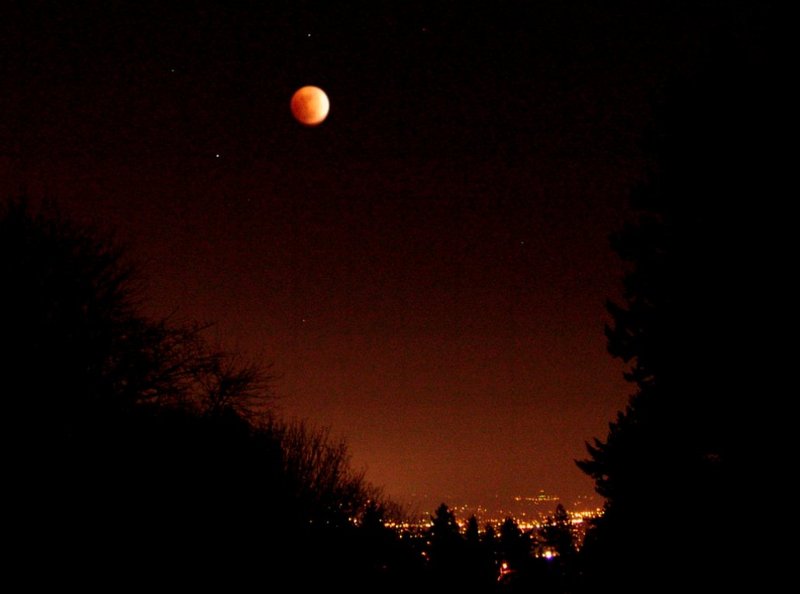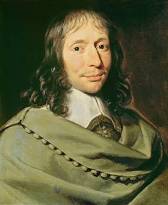 After coming home from dinner last night, Nanci and I enjoyed watching the total lunar eclipse. Wow. What a show. And it wouldn’t happen if God hadn’t made the moon just the size it is and set it at just the distance it is. The Sun's distance from the Earth is 400 times the Moon's, and the Sun's diameter is 400 times the Moon's. I just read an article on what an “amazing coincidence” this is. Yeah, right.
After coming home from dinner last night, Nanci and I enjoyed watching the total lunar eclipse. Wow. What a show. And it wouldn’t happen if God hadn’t made the moon just the size it is and set it at just the distance it is. The Sun's distance from the Earth is 400 times the Moon's, and the Sun's diameter is 400 times the Moon's. I just read an article on what an “amazing coincidence” this is. Yeah, right.
Most weeks now I’ll post a couple of blogs, a longer one like this (length of a short article), and a shorter one, like the last. The days I post will vary.

Blaise Pascal, who no doubt enjoyed eclipses, was a French mathematician and physicist, and later in his life, a Christian philosopher. Born in 1623, he died in 1662, at age 39, having accomplished several lifetimes of work. (And he had quite the hairdo.)
Pascal was a child prodigy educated by his father. His earliest work was in the construction of mechanical calculators, the study of fluids, and the concepts of pressure and vacuum. (My earliest work was reading Batman comics.)
Pascal was a top-level mathematician, who wrote a major treatise on projective geometry at the age of sixteen. When reading it, Rene Descartes refused to believe it could have been written by a sixteen-year-old. Pascal’s writings also influenced the development of modern economics and social science.
This is Pascal’s triangle, which I would gladly explain if I understood it. (Descartes would have had no difficulty believing anything mathematical I came up with was written by a sixteen-year-old.)
Following a profound encounter with God, at age 31 Pascal abandoned his scientific work and devoted himself to theology and philosophy. He then wrote his two most famous works, the Lettres provinciales and the Pensées. Pascal suffered from bad health throughout his life and died before age forty. (I’ve gleaned this biographical info from an article on Pascal.)
So what happened in that profound encounter with God?
On November 23, 1654, Pascal is said to have been involved in an accident at the Neuilly-sur-Seine bridge where the horses plunged over the parapet and the carriage nearly followed them. Fortunately, the reins broke and the coach hung halfway over the edge. Pascal and his friends emerged unscathed, but the sensitive philosopher, terrified by the nearness of death, fainted away and remained unconscious for some time. Upon recovering fifteen days later, between 10:30 and 12:30 at night, Pascal had an intense religious vision and immediately recorded the experience in a brief note to himself which began: "Fire. God of Abraham, God of Isaac, God of Jacob, not of the philosophers and the scholars…" and concluded by quoting Psalm 119:16: "I will not forget thy word. Amen." He seems to have carefully sewn this document into his coat and always transferred it when he changed clothes; a servant discovered it only by chance after his death. This piece is now known as the Memorial.
The most famous quote from Pascal is one that he apparently never said. It has variations, but goes something like this, with the key words being “God-shaped vacuum”: “There is within every man a God-shaped vacuum, an emptiness that only He can fill.”
Several of you confirmed my own experience in looking for this often-quoted statement from Blaise Pascal—it just doesn’t exist. (One of you suggested that perhaps Pascal’s work with the concept of vacuum led to the misquote.) The closest I’ve ever found, and two of you passed on the same, is the following. It’s very good, and all the better because Pascal really said it (Pensees, translated by W. F. Trotter, New York: E. P. Dutton, 1958):
What else does this craving, and this helplessness, proclaim but that there once was in man a true happiness of which now remain to him only the mark and empty trace, which he in vain tries to fill from all his surroundings, seeking from things absent the help he does not obtain in things present. But these are all inadequate, because the infinite abyss can only be filled by an infinite and immutable object, that is to say, only by God Himself.
The infinite abyss in our hearts, which might be called a vacuum, can only be filled by the infinite God Himself. We still have a trace of an ancient happiness that was in the hearts of Adam and Eve, a happiness which preceded sin and was ruined by it. But it was not utterly destroyed. Its mark is still upon us, and one day, when redemption is fully realized, God will fan it into flames again, never to be quenched. But even now, while living in the Shadowlands, we have times of burning joy, the foretaste of the eternal joy to come, the lesser streams of the JOY of which God Himself is the Fountainhead.
One final Pascal quote, which I love:
All men seek happiness. This is without exception. Whatever different means they employ, they all tend to this end. The cause of some going to war, and of others avoiding it, is the same desire in both, attended with different views. The will never takes the least step but to this object. This is the motive of every action of every man, even of those who hang themselves. (Pascal’s Pensées, thought #425, edited by Trotter, 113).
The surprising way this statement ends is profound, and right on the mark. Notice the distinction: we don’t make our choices based on what will bring us happiness, but on what we think will bring us happiness (no matter how wrong we may be).
The question is, what do we believe in our hearts will really bring us happiness? And what are we teaching our children will bring them happiness? If we look at the daily choices we make, in terms of how we spend our time and money, they will reveal the answer.
As long as I think the world and popular culture and diversion will bring me happiness, I will succumb to the quick fixes of a variety of addictions, including the endless entertainment which gives no lasting delight.
But when I believe God that ultimate happiness, transcendent Joy, is to be found in Him, then I will turn off the TV, turn off talk radio and sports radio, back away from the internet and video games, and open the Word of God and ask His Spirit to speak Joy into my life.
May we fix our eyes on the eternal Joy purchased for us on the cross of Jesus. No matter what difficulty today or tomorrow may bring, it is overshadowed by what awaits us in the redeemed heavens and earth.
“The sufferings of this present time are not worthy to be compared with the glory that will be revealed in us” (Romans 8:18).
For more, see Randy's blogs on happiness, as well as his book Happiness.
Photo by Leio McLaren (@leiomclaren) on Unsplash




